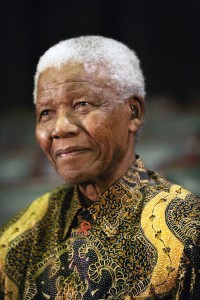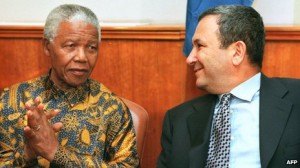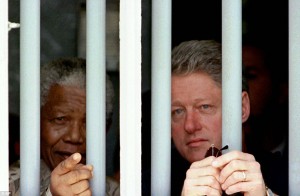“In real life we deal, not with gods, but with ordinary humans like ourselves: men and women who are full of contradictions, who are stable and fickle, strong and weak, famous and infamous.” – Nelson Mandela
At first glance, Nelson Mandela might seem to have more in common with Mao Zedong, Fidel Castro, or even Yasir Arafat than David Ben Gurion, Franklin Delano Roosevelt, or Winston Churchill. Mandela supported Palestinian statehood. Like Mao and Castro, and unlike Arafat, Mandela served as President of his country. Unlike Mao and Castro, Mandela stepped down and handed his office to an elected successor.
Mandela was, or may have been, a Communist (click here). As he noted at his 1964 trial, here, Churchill and Roosevelt joined forces with Josef Stalin to defeat the Nazis, but this did not mean that Churchill and Roosevelt were Communists or working to spread international communism. Similarly, Mandela, a socialist like David Ben Gurion (click here) worked with the Communist Party in pursuit of a common goal.
At his trial, in 1964, Mandela said,
It is true that there has often been close cooperation between the ANC and the Communist Party. But cooperation is merely proof of a common goal—in this case the removal of white supremacy—and is not proof of a complete community of interests.
As Steve Linde, writing in the Jerusalem Post, 12/6/15, noted, here,
“One of Mandela’s greatest strengths was his ability to bury but not forget the bitterness of the past, and actively work for a fairer future.
“He did so when, upon his release from 27 years in jail, he emerged without exhibiting any signs of anger, reconciling with president F.W. de Klerk (earning them both Nobel peace prizes) and even sipping tea with Betsie Verwoerd, the 94-year-old widow of apartheid’s architect, Dr. Hendrik Verwoerd.”
As Mandela told the court, in 1964,
… from my reading of Marxist literature and from conversations with Marxists, I have gained the impression that communists regard the parliamentary system of the work—of the West as undemocratic and reactionary. But, on the contrary, I am an admirer of such a system.
The Magna Carta, the Petition of Rights, the Bill of Rights are documents which are held in veneration by democrats throughout the world.
I have great respect for British political institutions, and for the country’s system of justice. I regard the British Parliament as the most democratic institution in the world, and the independence and impartiality of its judiciary never fail to arouse my admiration.
The American Congress, that country’s doctrine of separation of powers, as well as the independence of its judiciary, arouse in me similar sentiments.
I have been influenced in my thinking by both West and East. All this has led me to feel that in my search for a political formula, I should be absolutely impartial and objective. I should tie myself to no particular system of society other than that of socialism. I must leave myself free to borrow the best from West and from the East.
…
During my lifetime I have dedicated my life to this struggle of the African people. I have fought against white domination, and I have fought against black domination. I have cherished the ideal of a democratic and free society in which all persons will live together in harmony and with equal opportunities. It is an ideal for which I hope to live for and to see realized. But, My Lord, if it needs be, it is an ideal for which I am prepared to die.
This is where Mandela differed from Mao, Castro, and Arafat, where he can be compared to Ben Gurion and where he shows Netanyahu, Abbas, the Israelis and the Palestinians a path for a sustainable future. It may be unrealistic to expect the Israelis and the Palestinians to forget the bitterness of the past. But it is imperative that they work for a fairer and sustainable future.
–
Larry Furman co-founded Popular Logistics with Jon Soroko in 2007. Larry holds a Bachelor’s in Biology, the equivalent of a minor in Computer Science, and an MBA in “Managing for Sustainability” from Marlboro College, Vermont. He can be reached via e-mail to G-Mail, “L Furman 97″.


